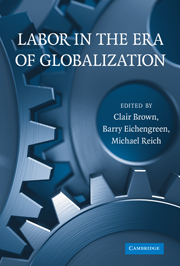Book contents
- Frontmatter
- Contents
- Tables and Figures
- List of Authors and Editors
- Introduction: Labor in the Era of Globalization
- PART ONE POLITICAL ECONOMY AND LABOR MARKET INSTITUTIONS
- 1 Institutions and Wages in Post–World War II America
- 2 American Exceptionalism and Comparative Political Economy
- 3 Finance and Labor: Perspectives on Risk, Inequality, and Democracy
- PART TWO INSTITUTIONS AND FIRM AND WORKER BEHAVIOR
- PART THREE CONTEMPORARY LABOR–MANAGEMENT RELATIONS
- PART FOUR PUBLIC POLICY AND U.S. LABOR-MARKET STRUCTURE
- Index
- References
2 - American Exceptionalism and Comparative Political Economy
Published online by Cambridge University Press: 05 June 2012
- Frontmatter
- Contents
- Tables and Figures
- List of Authors and Editors
- Introduction: Labor in the Era of Globalization
- PART ONE POLITICAL ECONOMY AND LABOR MARKET INSTITUTIONS
- 1 Institutions and Wages in Post–World War II America
- 2 American Exceptionalism and Comparative Political Economy
- 3 Finance and Labor: Perspectives on Risk, Inequality, and Democracy
- PART TWO INSTITUTIONS AND FIRM AND WORKER BEHAVIOR
- PART THREE CONTEMPORARY LABOR–MANAGEMENT RELATIONS
- PART FOUR PUBLIC POLICY AND U.S. LABOR-MARKET STRUCTURE
- Index
- References
Summary
INTRODUCTION
More than any other individual in my academic career, Lloyd Ulman shaped my interests in and intellectual approach to comparative political economy. He has had a profound – even dominating – influence on the development of comparative industrial relations. Although there has been much rich work on institutions and much economic modeling of unions and labor markets, Ulman put these divergent approaches together. What comes through insistently in his work is the need to both understand carefully how institutions in fact function (“Don't be taken in by their propaganda”) and to apply economic models to explain their behavior.
Ulman has been preoccupied throughout his career by the divergences and similarities between Europe and the United States, especially in the field of industrial relations and redistribution; previously, his interest was in understanding the history of American labor relations. These interests are fused in his typically analytical presidential address to the 1986 Industrial Relations Research Association (IRRA) annual meeting – from which I draw for this chapter – in which he attempts to understand why different industrial-relations systems developed differently (Ulman 1986). Indeed, his paper played a significant part in sparking a revisionist retake on the original debate on the exceptionalism of the American working class – Why no class-consciousness? Why no major socialist party? – that Sombart (1906) and Perlman (1928) had dominated in the early twentieth century and that can be traced back to Engels.
- Type
- Chapter
- Information
- Labor in the Era of Globalization , pp. 51 - 93Publisher: Cambridge University PressPrint publication year: 2009
References
- 6
- Cited by



